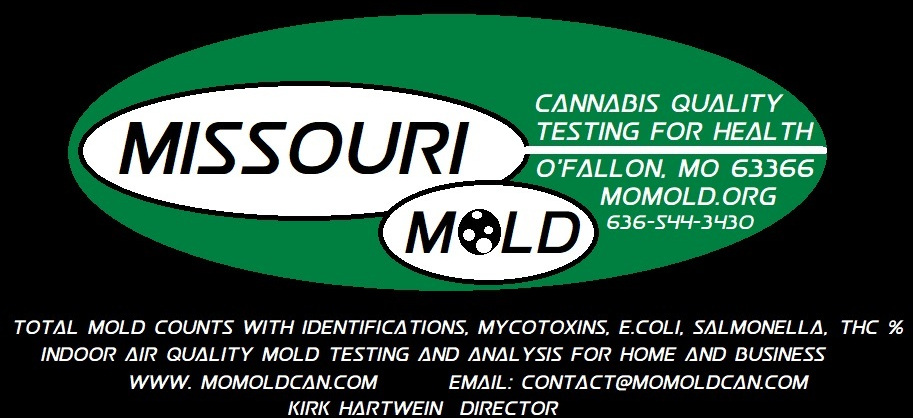Kirk Hartwein, B.S., Director of Missouri Mold, explains: “As a biologist, I make a living off studying the ecology of two-legged mammals that drive around in metal boxes“. And this has given him nearly 30 years of environmental microbiology experience. This is critical to understanding the needs of people and institutions where the quality control of environmental indoor air and consumer products (such as food, medicine, OTC goods) is of great significance.
Part of this background provides the platform for testing medicinal/recreational cannabis in Missouri. Routine testing of cannabis sold at licensed dispensaries often shows large amounts of filamentous fungi and yeast and this information is not readily available to the client. Currently, the State of Missouri has no limits on the amount of mold, fungi, yeast or bacteria allowed on medicinal/recreational cannabis and this information is not advertised. Moderate to high amounts of fungi in consumer products can have serious health implications and the medicines we take and food we eat should be first in line for this concern.
Missouri Mold will test your cannabis products to inform the total amount of mold present (per gram) in the product (and identification of the types of molds present when applicable). This is information is helpful if one is concerned for health and safety reasons.
Despite the thought of handling, inhaling, or eating moldy medicine being bad enough, one also has to consider the encompassing end-user risk. When cannabis became legal in one way or another across America, part of the purported benefits was for people who are immunocompromised, elderly, veterans or cancer patients; all of whom would not want pathogenic fungi in the medicine that they presume to be safe. Their lives could be at risk and they would not know.
Missouri cannabis testing has shown a diverse assortment of genera of mold types. Many of these are opportunistic pathogens and potentially dangerous for the vulnerable. Among the diversity of mold species found in dispensary cannabis is Penicillium mold. This genera are composed of dozens of species, some of which are present in purchased dispensary products and the mycotoxins they produce can be dangerous.
One to two percent of Americans may be allergic to Penicillin antibiotics. Handling sticky cannabis, ingesting or smoking could unknowingly lead to medical conditions. Despite the various mycotoxin concerns, routine inhalation exposure to moldy cannabis can lead to fungal infections of the respiratory system which can be hard to diagnose and slow to treat. Other mold types found in dispensary cannabis is Aspergillus (being tested for by state labs), Fusarium, Acremonium and pathogenic bacteria deliberately applied to the plant as fungicide.
